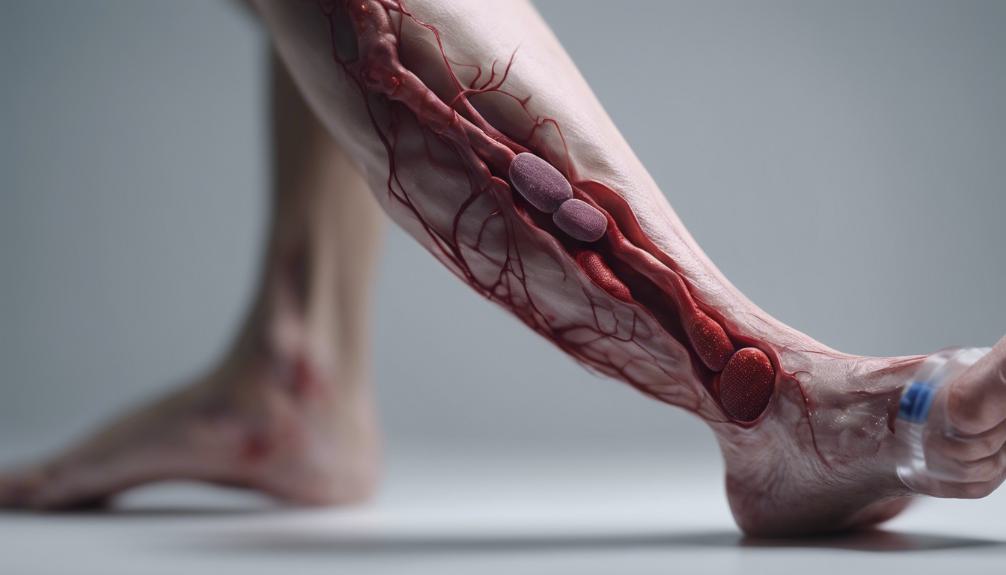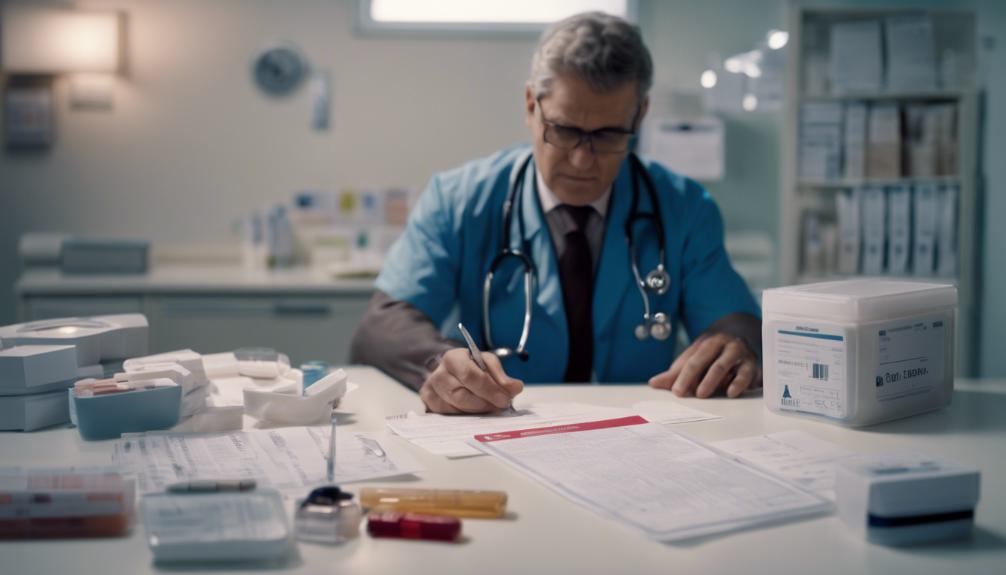Xeljanz Linked to Dangerous Blood Clots
In one of the latest reports, a patient on Xeljanz for rheumatoid arthritis developed deep vein thrombosis, marking yet another case in a growing list of concerns surrounding the drug. We're here to unpack the complexities of how Xeljanz is linked to dangerous blood clots, a topic that's becoming increasingly critical for us to understand. Given the severity of the potential side effects, including life-threatening conditions such as pulmonary embolism, it's essential we explore what this means for those of us relying on this medication. Join us as we navigate the fine line between treatment benefits and the risks that come with it, aiming to arm ourselves with the knowledge needed to make informed decisions about our health.

Key Takeaways
- Xeljanz increases the risk of life-threatening blood clots, including DVT and PE.
- Symptoms of blood clots range from leg pain and swelling to difficulty breathing.
- Approximately 100,000 Americans die annually from blood clot complications.
- Patients using Xeljanz should monitor for blood clot symptoms and consult healthcare providers immediately.
Understanding Xeljanz

Xeljanz, a medication designed to treat certain autoimmune diseases, has raised concerns due to its association with serious health risks. We're committed to helping our community understand these risks, especially since many of us are caretakers or patients seeking relief from conditions like rheumatoid arthritis, psoriatic arthritis, and ulcerative colitis. While Xeljanz offers hope for managing symptoms, we've learned it's important to weigh the benefits against potential dangers. Our goal is to make sure everyone's well-informed, enabling them to make the best decisions for their health and those they care for. We encourage open discussions with healthcare providers about the risks linked to Xeljanz, including cardiovascular issues and cancer, to tailor a treatment plan that's safe and effective for each individual.
Blood Clot Risks

Understanding the risks associated with blood clots is important for anyone taking Xeljanz, as the medication greatly increases the likelihood of developing conditions like deep vein thrombosis and pulmonary embolism. We're committed to helping others understand these risks so they can make informed decisions about their health. Symptoms such as leg pain, swelling, redness, difficulty breathing, and chest pain should prompt immediate medical attention. It's our duty to serve our community by spreading awareness about these potential dangers. Educating ourselves and others allows us to advocate effectively for those we care about, ensuring they're aware of the signs and symptoms of blood clots. Let's work together to safeguard our health and the well-being of those around us.
Cardiovascular Concerns

We now turn our attention to the cardiovascular risks associated with Xeljanz, highlighting the drug's link to serious heart-related issues. As we investigate further, it's important to understand that individuals with a predisposition to heart diseases may face increased risks. The spectrum of cardiovascular problems linked to Xeljanz isn't limited; it ranges from arrhythmias to heart attacks, conditions that can have devastating impacts on one's health. Recognizing these risks is essential, especially considering heart disease's prominence as a leading cause of death in the U.S. We're committed to raising awareness about these concerns, encouraging those affected to seek guidance and support. By sharing this knowledge, we aim to empower individuals to make informed decisions about their health, fostering a community of care and vigilance.
Cancer Connections

Exploring the link between Xeljanz and cancer, it's vital to highlight that this medication may greatly increase the risk of developing various types of cancer. We've learned that individuals taking Xeljanz could face heightened chances of lung, breast, prostate, and other cancers. For those of us dedicated to serving others, it's essential to spread awareness about these risks.
We advise everyone to maintain open communication with healthcare providers, discussing any concerns about cancer risks associated with Xeljanz. Creating personalized treatment plans with medical professionals is essential. By understanding and addressing these potential risks, we can better support those we serve, ensuring they're informed and prepared to make decisions about their health. Let's work together to safeguard the well-being of our communities.
Symptoms to Watch

After discussing the increased cancer risks associated with Xeljanz, it's also important to recognize the symptoms that may signal blood clots or cardiovascular issues. As we're committed to helping others, let's make sure we're aware of the signs to look out for. Symptoms of deep vein thrombosis (DVT) include pain, swelling, and redness in the legs. If you're experiencing difficulty breathing, chest pain, or coughing up blood, these could be indicators of pulmonary embolism (PE). Since heart disease is a leading cause of death, being vigilant about any cardiovascular symptoms is vital. Our goal is to empower everyone with the knowledge to seek timely medical intervention. Keeping an eye on these symptoms can save lives, highlighting our commitment to serving and protecting our communities.
Legal Rights and Advice

Traversing the legal landscape, those impacted by Xeljanz-related conditions should consider seeking professional advice to comprehend their rights and potential legal actions. It's vital we grasp the implications of these health risks and how they affect our lives. Legal experts can guide us through the process, ensuring we're informed about our options for seeking justice and compensation. By engaging with knowledgeable attorneys, we can uncover the potential for legal recourse, which may offer some solace and support in maneuvering these challenging times. We're committed to empowering ourselves and others in similar situations by exploring every avenue available to hold responsible parties accountable. Let's stand together in seeking the guidance and representation we deserve, ensuring our voices are heard and our concerns are addressed.
Seeking Medical Guidance

In light of these risks, it's important we consult healthcare professionals to navigate potential health issues related to Xeljanz. Recognizing symptoms early and discussing them with a doctor can make all the difference. It's our duty to seek guidance not only for ourselves but also to aid those around us who may be unaware of the dangers. We must encourage open conversations about any discomfort or unusual signs, especially those linked to blood clots, cardiovascular problems, or unexpected changes in health. Let's remind each other to schedule regular check-ups and to be honest about our medical history and any current symptoms. It's through these proactive steps that we can safeguard our health and support our community in facing these challenges.
Frequently Asked Questions
Can Lifestyle Changes or Natural Remedies Reduce the Risk of Adverse Effects When Taking Xeljanz?
We're exploring if lifestyle changes or natural remedies can mitigate adverse effects from Xeljanz. It's crucial we communicate with doctors to tailor safe, effective strategies, aiming to serve those we care about with informed choices.
How Does the Effectiveness of Xeljanz Compare to Other Medications for Similar Conditions?
We're exploring how Xeljanz stacks up against other treatments. While it's a go-to for some, we're weighing benefits against risks, aiming to serve our community with the safest, most effective care options available.
Are There Any Specific Dietary Restrictions or Recommendations for Patients Taking Xeljanz to Minimize Health Risks?
We're curious if there are dietary changes we can make to reduce health risks while taking Xeljanz. It's crucial we comprehend how food might interact with medication to better serve those we care for.
What Are the Long-Term Implications of Discontinuing Xeljanz Therapy Prematurely Due to Fear of Side Effects?
We comprehend concerns about stopping Xeljanz due to side effects might seem overwhelming, but it's essential we prioritize long-term health. Consulting healthcare providers guarantees we're making informed decisions, safeguarding our well-being together.
How Does Xeljanz Interact With Other Common Medications or Supplements That Patients Might Be Taking?
We're exploring how Xeljanz interacts with other medications or supplements one might be taking. It's important to consult healthcare providers to avoid adverse reactions, ensuring the safety and well-being of those we serve.

This post has been generated by AI and was not reviewed by editors. This is Not legal advice. Please consult with an attorney.




